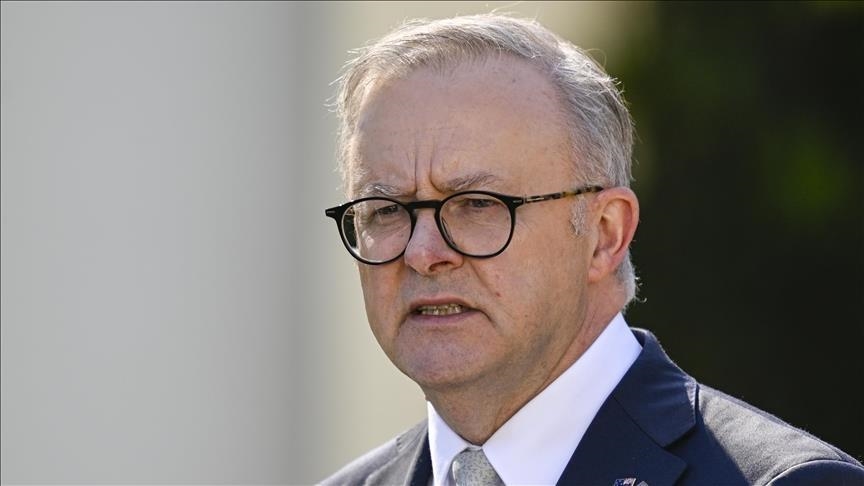US' Asian allies, rivals criticize new tariffs, vow to respond
China vows 'resolute' measures as South Korea pledges 'all-out' response while Australia calls move 'unwarranted'

KARACHI, Pakistan
The US' Asian trading partners reacted sharply Thursday to US President Donald Trump's announcement of broad-based import tariffs, with the Australian prime minister calling the move "unwarranted." However, Washington's traditional allies left room for negotiations to navigate the new challenges in their bilateral ties.
In announcing a mix of universal and country-specific tariffs, Trump declared "Liberation Day" for the US, which he claims for decades has been "looted, pillaged, raped and plundered by nations near and far, both friend and foe alike."
The announcement presents 34% reciprocal tariffs for China, 46% for Vietnam, 32% for Taiwan, 24% for Japan, 26% for India, 29% for Pakistan, 36% for Thailand, 32% for Indonesia, 24% for Malaysia, 49% for Cambodia, and 10% for Australia.
Japanese Prime Minister Shigeru Ishiba called the US reciprocal tariffs "unfortunate” and “regrettable."
Vowing to protect Japanese industries and jobs, Ishiba responded by saying they "won't hesitate to urge Trump to rethink tariffs if needed."
Expressing "extreme regret" and "serious concern," Trade Minister Yoji Muto conveyed Japan's concerns to US Commerce Secretary Howard Lutnick.
Government spokesman Yoshimasa Hayashi said Japan was "seriously concerned about whether the tariff measure is consistent with World Trade Organization rules," according to Tokyo-based Kyodo News.
'Not the act of a friend,' says Australia
Australian Prime Minister Anthony Albanese condemned the new US tariffs as "unwarranted" and "not the act of a friend."
Albanese said Trump's announcement of a 10% tariff on all imports from Australia did not come as a "surprise" to the government but called them illogical, the Australian Broadcasting Corporation reported.
"The (Trump) administration's tariffs have no basis in logic and they go against the basis of our two nations' partnership," he told reporters in Melbourne.
Reiterating that Canberra will not impose reciprocal tariffs on Washington, he said Australia would use "dispute resolution mechanisms" in the free trade agreement between the nations.
The Australian Broadcasting Corporation reported Wednesday that Albanese's government was preparing to take the US to the World Trade Organization for breaching the free trade agreement.
South Korea to go 'all-out' against tariffs
South Korea's acting president instructed the government to go "all-out" to respond to the US announcement of 25% on imports from his country.
Han Duck-soo gave the instruction during an "emergency meeting" in Seoul of an economic and security strategy task force, which included the finance and industry ministers and other senior officials, shortly after Trump announced tariff rates for all US trading partners, including South Korea, Yonhap News reported.
"As the situation is very grave with the approach of the reality of a global tariff war, the government must pour out all of its capabilities at its disposal to overcome this trade crisis," Han was quoted as saying by the news agency.
He also instructed the government to immediately formulate emergency support measures for local companies and sectors hit by the tariffs, including the auto industry.
China vows 'resolute' response
China firmly opposed the new US tariffs.
A Commerce Ministry spokesman said Thursday that Beijing will "resolutely" adopt countermeasures to safeguard its rights and interests, state-run Xinhua News reported.
The spokesman urged Washington to "immediately" cancel the new tariffs.
In a commentary, Xinhua News said that by turning trade into an over simplistic tit-for-tat game, Washington is dismantling a global trade system based on efficiency, specialization, and mutual benefit, while harming both the US economy and global economies.
"Washington's tariff obsession is not only failing to revive US industries, but also setting them back. Even more troubling for American policymakers, this approach risks leaving the United States sidelined as the global economy moves forward without it," it added.
India ‘examining indications’
India said it was “carefully examining the implications” of the 26% tariffs announced by Trump.
The Commerce Department "is engaged with all stakeholders, including Indian industry and exporters, taking feedback of their assessment of the tariffs and assessing the situation,” read a statement from the ministry. "The Department is also studying the opportunities that may arise due to this new development in the US trade policy.”
Thai Prime Minister Paetongtarn Shinawatra said Bangkok has "prepared measures, including negotiations and import tax restructuring, to deal" with the Trump administration’s 36% reciprocal tariffs on exports from the Southeast Asian nation to the US market.
Trump imposed a 36% reciprocal tariff on goods imported from Thailand.
Bangladesh said it was reviewing Trump's new 37% tariffs on its products exported to the US.
Faced with a levy of 32%, Taiwan called Trump’s decision "highly unreasonable" and said it deeply regretted it, adding that it planned "serious negotiations" with Washington.








